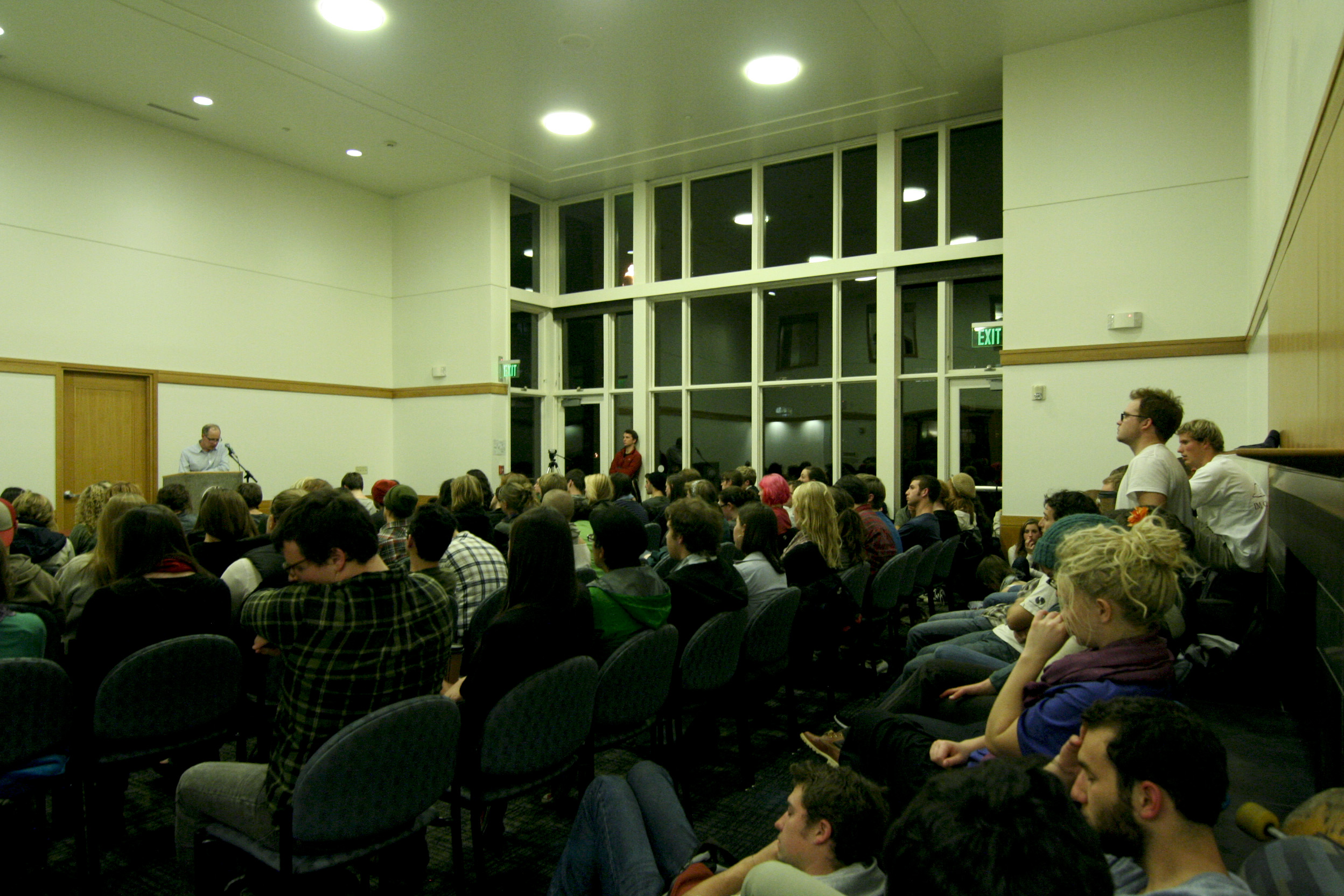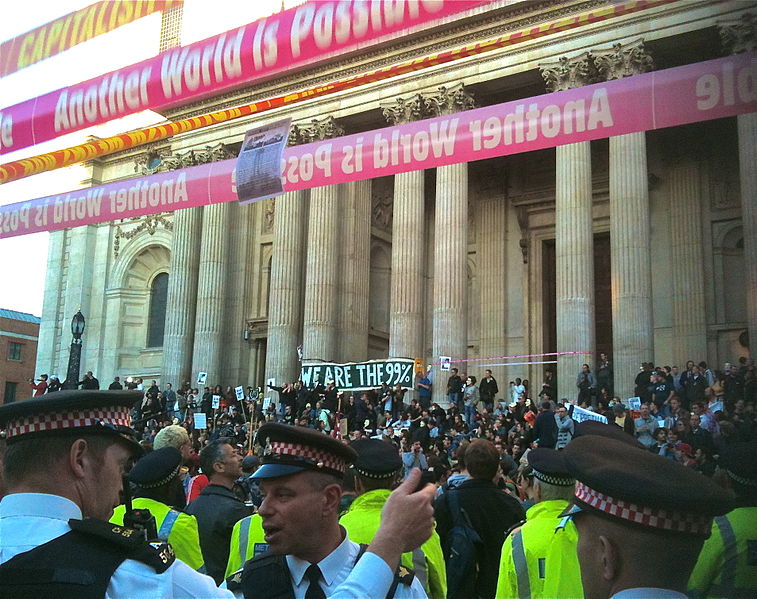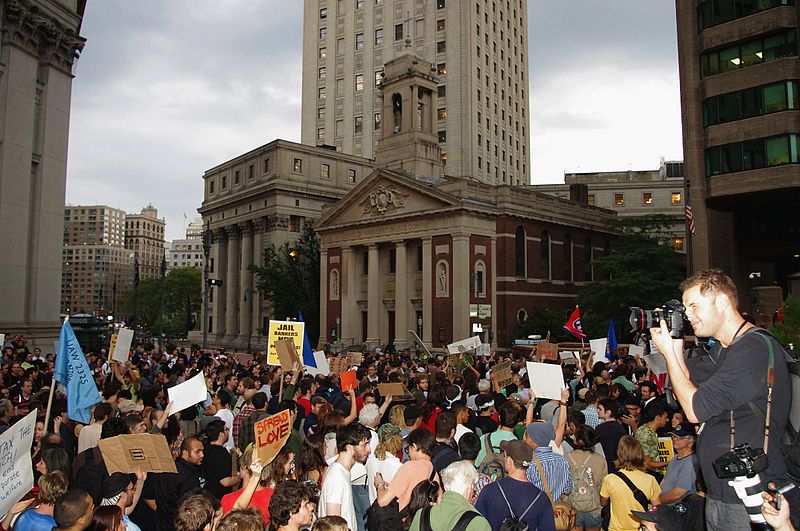
On Monday, Nov. 7, 2011, Trimble Forum was filled with the buzz and heat of over 200 students, spilling out into the hallway. The hot air was filled with words like “inequality,” “the 99%” and, of course, “occupy.” In the front were three professors—Stuart Smithers of the Religion department, Brad Dillman of International Political Economy and Robin Jacobson of Politics and Government. Together they formed a de facto panel of experts on the Occupy Movement.
This event is the first in a series of panel discussions about issues raised by Occupy Wall Street. Polly Membrino, a senior Politics and Government major, was one of the students who organized the event. It was held with the hope to inform the student body, which Membrino sees as largely apathetic.
“It’s ridiculous that the bubble that houses our academic institution is the same bubble that breeds ignorance and apathy when it comes to real world problems. You would think a liberal arts school would have very politically aware students, but unfortunately our school so often fosters a high level of respect of academics but less so for current events,” Membrino said.
Membrino’s claim holds some truth. As the Occupy movement has grown in the past two months to over 900 towns in over 82 countries, it has increasingly become a topic of serious discussion in both the national media and also in Puget Sound classrooms. However, many students admit to a feeling of indifference toward the movement.
In a very informal survey of students in Diversions on a Saturday afternoon, 16 said they cared about the movement while 15 did not. Those that did not included students who disagreed with its message, but the vast majority said they simply did not have time to participate. Others were interested, but found the movement difficult to understand.
A senior music major, Joan Hua, said, “I didn’t understand it, because it doesn’t seem to have a strong message. It’s be made up of a lot of people who are frustrated about the economy, and I feel the same way, but I don’t know if participating would be helpful.”
The panel did not aim to inspire more political participation on the part of students, but rather to inform. Smithers spoke about the theoretical orientations of the movement, Jacobson discussed various ways to frame the success of the movement while Dillman compared the Arab Spring with the Occupy movement.
STUART SMITHERS: WE ARE ENTERING THE UNKNOWN
Smithers has been an advocate for the Occupy movement both in the classroom and the public realm by publishing supportive articles in The Stranger and attending Marxist conferences in New York and Philadelphia. Both conferences resulted in trips to the local Occupy encampments. He regaled the audience with stories of a spontaneous march to Occupy Philadelphia led by Angela Davis, who gave a celebratory speech to the snow-huddled masses.
His remarks included a scattered yet evocative history of the rise of neoliberal policies since the 1980s, which Smithers critiqued in his usual offhand manner. He argued that many Marxists have become disillusioned by the pervasiveness of capitalism. He cited the truism that “people can imagine the end of the world, but they can’t imagine the end of capitalism.” However, Smithers rebutted this belief with a statement that Slavoj Zizek, an outspoken philosopher and critical theorist, delivered to Occupy Wall Street: “Listen, you’re not destroying anything, you are all witnessing capitalism destroying itself.”
Smithers related the issues of Occupy Wall Street to the campus community by delivering a number of devastating statistics. There was an audible gasp in the room as he told us, “In 2010, the average Puget Sound student left with $26,000 in debt, and 74 percent of the students at the campus did leave with some debt. And that rate, as much as I can tell, has doubled in 15 years.” He also painted a grim picture of life after college.
“Studies show that anyone who graduated during a recession makes 30 percent less for their entire lifetime than people who don’t graduate in a recession,” he said.
He also outlined the lesser-known intellectual history of the movement, with its beginnings in a call from “culture-jammer” Adbusters magazine, the inspiration from the French 1960s situationist movement and the role of anthropologist David Graeber in enacting truly horizontal organization and consensus decision-making at the first general assembly in New York City.
Throughout his speech it became clear that Smithers is cautiously hopeful that eventually, there will be radical change from the current system.
“We are entering the unknown. It may take 20 years, there may be lots of volatility, but we haven’t seen this before and we don’t know where we are going. They keep having this constant state of emergency, but I don’t think they have an endgame either, they being the one percent, or the power-possessors.”
ROBIN JACOBSON: WHAT COUNTS AS A WIN?
Robin Jacobson is a specialist in social movements and used her short address to answer the question “What counts as a win?”
Jacobson mentioned that newspapers have highlighted the end of the five dollar fee for debit cards or the shut down of the Oakland port as victories. However, she argued that the wins of the movement should look beyond their demands, or lack thereof.
Instead, she outlined two ways they may “win.” The first win is the very fact that the movement is able to exist, and in the process, enact its own small-scale utopias. Second, the movement has put into question the efficacy of the democratic system and forced an opening of the debate.
The first win she termed “prefigurative politics,” a label that originates with New Social Movements of the 1960s and 70s, meaning through their tactics, protesters are also acting out their worldviews.
“The tactics of Occupy Wall Street and Occupy Everywhere are not just about their economic goals, it’s about living out the world now that they want to see. It’s about the general assembly, it’s about lack of hierarchy, this is about communal engagement,” Jacobson said.
Jacobsen believes the Occupy Wall Street movement is unique in melding these tactics with class concerns. “So I think you see something monumental, for the first time happening—a combination of the New Movements, the identity movements, with class movements.”
To Jacobson, this can be counted as a victory, with the caveat “for as long as it lasts.” The second “win” comes from Jacobson’s belief that protest emerges when the democratic system is broken.
“Protest requires that people fundamentally believe that democratic institutes as they currently exist aren’t going to work. That’s why people take to the streets,” Jacobson said. This type of protest aims to open the avenues of political change, or change the discussion, a goal that Jacobson thinks they have begun to achieve.
“If we think about it as getting people’s voices heard, this protest has already been pretty darn successful. You see that the debate has been fundamentally reframed. This killer ‘99 percent’ phrase is now the frame everyone is talking about. It’s no longer about taxing people who make $200,000 or more or not. It’s changed the line along which people understand their own relationship to the politics today.”
The shift is seen across America. Jacobson mentioned a poll in the Wall Street Journal that said 75 percent of people agree the system favors the rich, but 52 percent of the people feel that no one should have more taxes levied upon them. Policy makers will need to respond to this shift.
“This suggests the opening up of the democratic system that led people to take to the streets in the first place,” Jacobson said.
BRAD DILLMAN: DEEP PARALLELS WITH ARAB SPRING
Brad Dillman has become the resident expert in Middle Eastern politics, especially the Arab Spring. He drew parallels between the Occupy Movement, which is explicitly inspired by the Arab Spring, the uprisings in the Middle East and protests seen around the globe.
Dillman first pointed out that the Occupy Movement uses the same methods of resistance as the Arab Spring.
“If you think about the fact that, again, people are gathering in public squares, they are pitching tents, they’re cooperating with one another, they’re relying not on the government but on self-help systems and are seeking to create a sense of community and social solidarity. Those are all some of the hallmarks of the Arab Spring,” he said.
However, he reminded us that the Arab Spring was also a demonstration against American foreign policy. He highlighted American hypocrisy in supporting dictators while spouting pro-democratic rhetoric, American politician’s reluctance to support the demonstrators and finally, America’s hollow claim of democratizing the Middle East while leaving Afghanistan and Iraq “a horrendous mess,” as criticisms raised by the Arab protesters.
Although the Arab Spring was critical of America, he argued that the two movements are both popular reactions against a lack of economic opportunity in a system dominated by elites.
“There had been a system of crony capitalism, where the one percent of these Arab countries had completely dominated a so-called process of economic reform and had used it as a cover to pillage the resources from their societies since the early 1980s. I think in many ways we have seen the same processes unfold in the United States with the rise of a parasitic financial class. The financialization of society is our form of crony capitalism,” Dillman said.
Finally, Dillman showed that the movement unites social classes, similar to in Egypt and Tunsia but also features many student and labor activists.
“There is a sense of taking public space and “re-publicizing” it—taking over space in the city and the country that had not been a venue for public opinion to be expressed,” he said.
Dillman also mentioned that this model of protest is being reproduced across the world, especially in the anti-austerity protests in Europe.
All in all, Dillman was supportive of the aims of the movement but cautious about its prospects for success.
“The movement has given us inspiration in our society, for many other people who don’t have a voice but I think are living vicariously through those small groups of people, when you look at our political population, who go out and take a stand in the streets. It remains to be seen whether it can sustain this critique of the neoliberalism and whether it can discredit this economic ideology that has held our country hostage since the beginning of the Reagan era,” Dillman said.
QUESTIONS AND ANSWERS—WHERE DO WE GO FROM HERE?
As the panel opened up for questions, it became clear that the majority of the students present were well versed in the issues of the Occupy movement and many were familiar with language of contentious politics. Tellingly, the discussion continually returned to the issue of a lack of concrete demands and the possible outcomes of the movement.
The questions about demands took many different forms. One student mentioned that the lack of demands means he can’t explain it to his grandfather. Another saw the danger that this movement may become overly emotional if it is not rooted in actionable policies.
“As it begins to seem more feasible that these demands could be met through normal legislative processes, or electing certain candidates, we actually may see a move in that direction. I don’t think that the movement as a whole is opposed to political institutions. It’s an open question what it looks like from here on out, now that it is on the agenda. It’s [democracy] cracked open,” Jacobson said.
To this Smithers replied, “From a theoretical point of view, it’s incredibly intelligent not to come up with a goal. Because you can’t fail.”
He believes this movement is not concerned with reforming democracy but instead reshaping the entire system. If it succeeds, then demands must be addressed. “Of course, there is always the question, what do you do the day after the revolution?”
Other students asked if the support of political institutions, such as the Democratic Party, could be a game changer? Or, another countered, would it only lead to co-optation?
The panel agreed that co-optation was a real possibility. Jacobson used the Populist party as an example of a wide-spread, politically viable movement that supported the Democratic presidential candidate and subsequently disappeared. Dillman pointed to the struggles that the Arab Spring revolutionaries are going through to preserve the spirit of the revolution. Finally, Smithers proclaimed Obama a “total heartbreak” and an emblem for why the movement does not trust the Democratic guard.
One student asked, what do you think we, as students, should do?
With a smile, Dillman told the story of the Harvard students who staged a walk-out of introductory Economics because the professor was an economic advisor to Bush. “So you know, stage a walk-out. Just not in my class.”
Smithers decided to impart the advice “Don’t trust anybody over 30. But we should remember the greatest danger is that people get out of college and they stop thinking.”
As the Q&A session ended, Jacobson neatly summarized the issue:
“I think the driving question here is: Is this a real marker of transformation and change, or is this a protest that will be co-opted, that will return to legislative politics, that will reinforce the existing system for however long? And I don’t have the answer to that.”
STUDENT RESPONSES
“One of the best details [during the Q&A] was the change in the discourse about inequality. The movement has failed to create a solution and the panel here failed to recognize the efficacy hasn’t blossomed yet, so I think the panel did a good job honoring the endeavors of the Occupy Wall Streeters but tried to hide the fact that the efficacy hasn’t shown up yet,” Will Roundy, a Classics and History major, said.
Nora Wahlund, a FLIA Spanish major who has actively participated in Occupy Tacoma said, “I think the goal was to inform what it is about, or issues that are raised by it, not necessarily to be spokespeople for it. I think the professors did a pretty good job of trying to walk that line. I think students were trying to demand that they represent and personify something they aren’t. But I’m really glad this happened.”
Melissa Gaughan, a Politics and Government major, found it academically interesting.
“It put it into a greater theoretical context, especially in the way they were talking about Marx and Zizek. I thought the connections to global movements was a bit strained,” Gaughn said.
PHOTO COURTESY / MEGAN CHAMBERS


